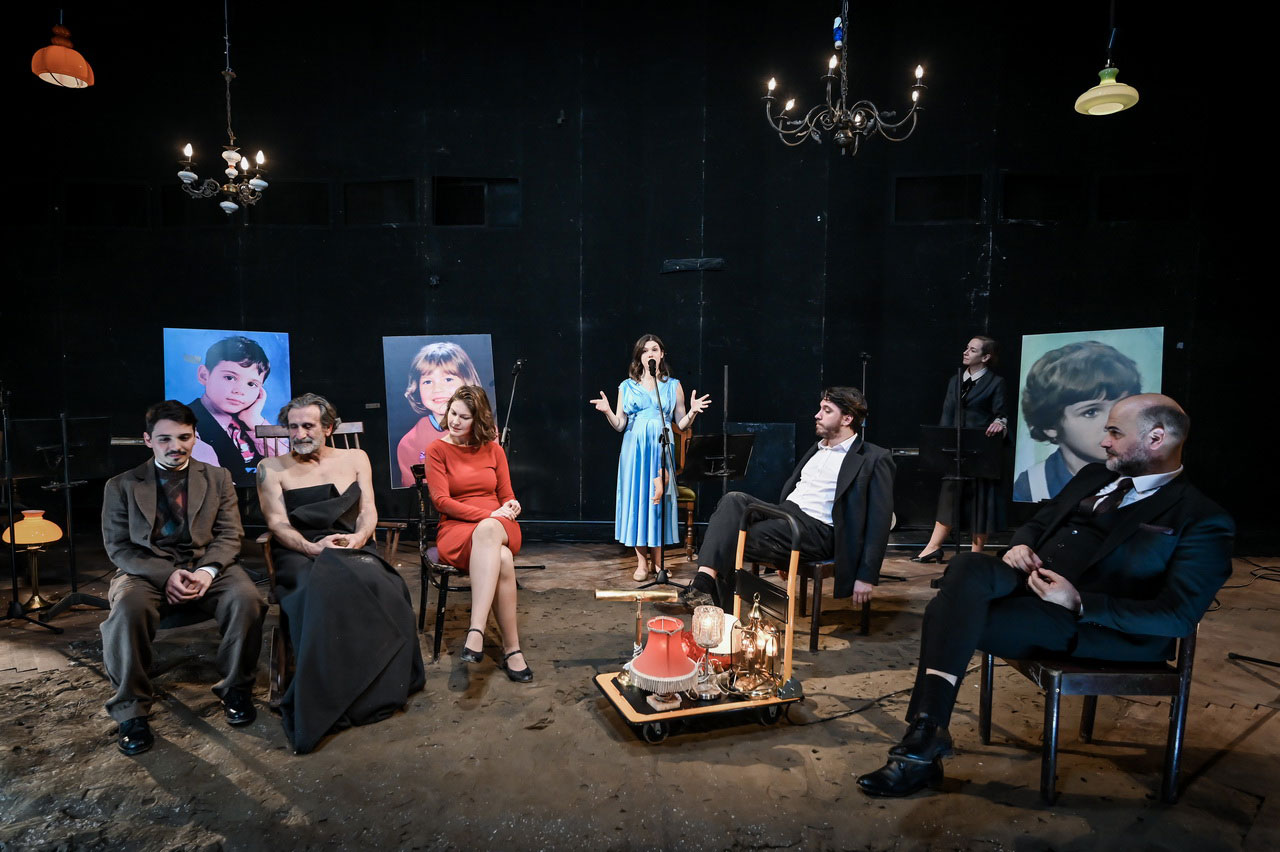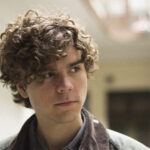Serbian National Theatre, Novi Sad, premiere 17th March 2023
The recent oeuvre of the Slovenian theatre director Jernej Lorenci has been characterized by an apparent contradiction – while he almost exclusively directs shows based on big, epic narratives from complex literary works, he dramatizes and directs them in a distinctly minimalist style.
For example, he directed The Iliad based on Homer, Kingdom of Heaven using Serbian medieval epic poetry and Eichmann in Jerusalem which he generated from Hannah Arendt’s book of the same name. But all of these shows were placed in modest, unpretentious scenic landscapes where every visual element was thoughtfully considered before put on stage and where the actors played the leading role in bringing the theatrical magic to life.
The Gospel According to F.M. Dostoyevsky, at the Serbian National Theatre in Novi Sad, is no exception. The show is based on fragments from a number of Dostoyevsky’s novels, including Crime and Punishment, The Brothers Karamazov, Demons and Humiliated and Insulted, with these narratives and their philosophical reflections merged into an almost four-hour performance with subdued and carefully measured stage expression.
When dramatizing Dostoyevsky or directing a performance inspired by his work, most authors struggle to translate Dostoyevsky’s literary writing into dramatic and performative language. The result is often a show that is relatively faithful to Dostoyevsky’s narrative but simplified in conceptual and philosophical terms. Lorenci and his dramaturg Matic Starina make no attempt to faithfully transport Dostoyevsky’s narrative structures to the stage, at least not in total, but use fragments from his novels and compose them into a mosaic that addresses a selection of the writer’s existentialist questions.
The philosophical focus of The Gospel According to F.M. Dostoyevsky is centred around questions of does God exist and if he does, how come he created such hell on Earth where we live in so much pain and suffering; and if he doesn’t exist, what hope do we have of getting out of this misery and cruelty? Lorenci and Starina primarily raise these questions by presenting stories of children’s suffering. And indeed, a child is such an important leitmotif that a picture of a child is in the forefront of the performance poster (those who watch the performance will learn that the child on the poster is young Raskolnikov). To rephrase the questions at the beginning of the paragraph – if children as the most innocent human beings are suffering so much on Earth, is that proof that God doesn’t exist or that he is utterly cruel?
Although the actors play a crucial role in the performance, they mostly do not get a chance to play Dostoyevsky’s characters in a classical dramatic way but instead narrate their stories, in the style of epic theatre. That doesn’t impede them from realizing powerful and convincing performances that are as important to the show as the clever collage-making dramaturgy. When Sonja Kesler delivers the terrifying opening monologue about the child Raskolnikov who witnesses drunken locals beating a weak mare to death, she delivers it with such steadiness and a sense of rhythm that the audience is haunted by her performance as well as the story.
A sense of rhythm is exactly what’s needed in a show so heavily based on text and complex existential questions and that’s something that both Lorenci and the actors understand. The rhythm usually functions thanks to shifts between segments of the show which are calmly delivered but with underlining tensions and those segments where tensions and emotions explode. An example of the latter is a scene where Dušan Vukašinović powerfully plays Ivan from The Brothers Karamazov and narrates the famous story about Christ and the Grand Inquisitor. Vukašinović’s acting is appropriately expressive in this scene as he delivers the philosophical climax of the show where the absurdity of religion is laid bare.

The Gospel According to F.M. Dostoyevsky – Serbian National Theatre, Novi Sad
Other elements of the show – set design, costumes, light and music – play subtle but important roles. The actors are dressed in elegant, civic suits and dresses (costumes: Belinda Radulović), as if they were going to a fancy dinner party or to theatre to discuss complex existential questions, unencumbered by outside problems (pun intended). This low-key bourgeoisie feeling that presents itself as neutrality is supported by a few decorations in the set design (Branko Hojnik) like the chandeliers. Though it is also notable that in the middle of the stage and its parquet floor is a layer of thick mud which actors often step onto when they play an active role in the scene.
There are some artistic decisions that are out of touch with the rest of the show and most of them come near the ending. One is the lavish, cacophonous accumulation of props and visual elements near the very end that’s not only out of step with Lorenci’s minimalism but needlessly mystifies and confuses the ending of the show. Another excessive element is the streaming of audio-interviews with children who naively speak about big life-and-death topics; this segment deviates from the style of the show and strongly underlines the leitmotif of a child that it borders the pathetic. But to focus too much on these jarring elements would be splitting hairs and overlooking the fact that Lorenci and his team of collaborators have created a powerful show that vividly brings Dostoyevsky’s philosophical questions to life.
Credits:
Director: Jernej Lorenci// Set designer: Branko Hojnik// Costume designer: Belinda Radulović// Composers: Branko Rožman and Dimitrije Beljanski// Choreographer: Gregor Luštek
For tickets and further information, visit: snp.org.rs
Borisav Matić is a critic and dramaturg from Serbia. He is the Regional Managing Editor at The Theatre Times. He regularly writes about theatre for a range of publications and media.
He’s a member of the feminist collective Rebel Readers with whom he co-edits Bookvica, their platform for literary criticism, and produces literary shows and podcasts. He occasionally works as a dramaturg or a scriptwriter for theatre, TV, radio and other media. He's the administrator of IDEA - the International Drama/Theatre and Education Association.








